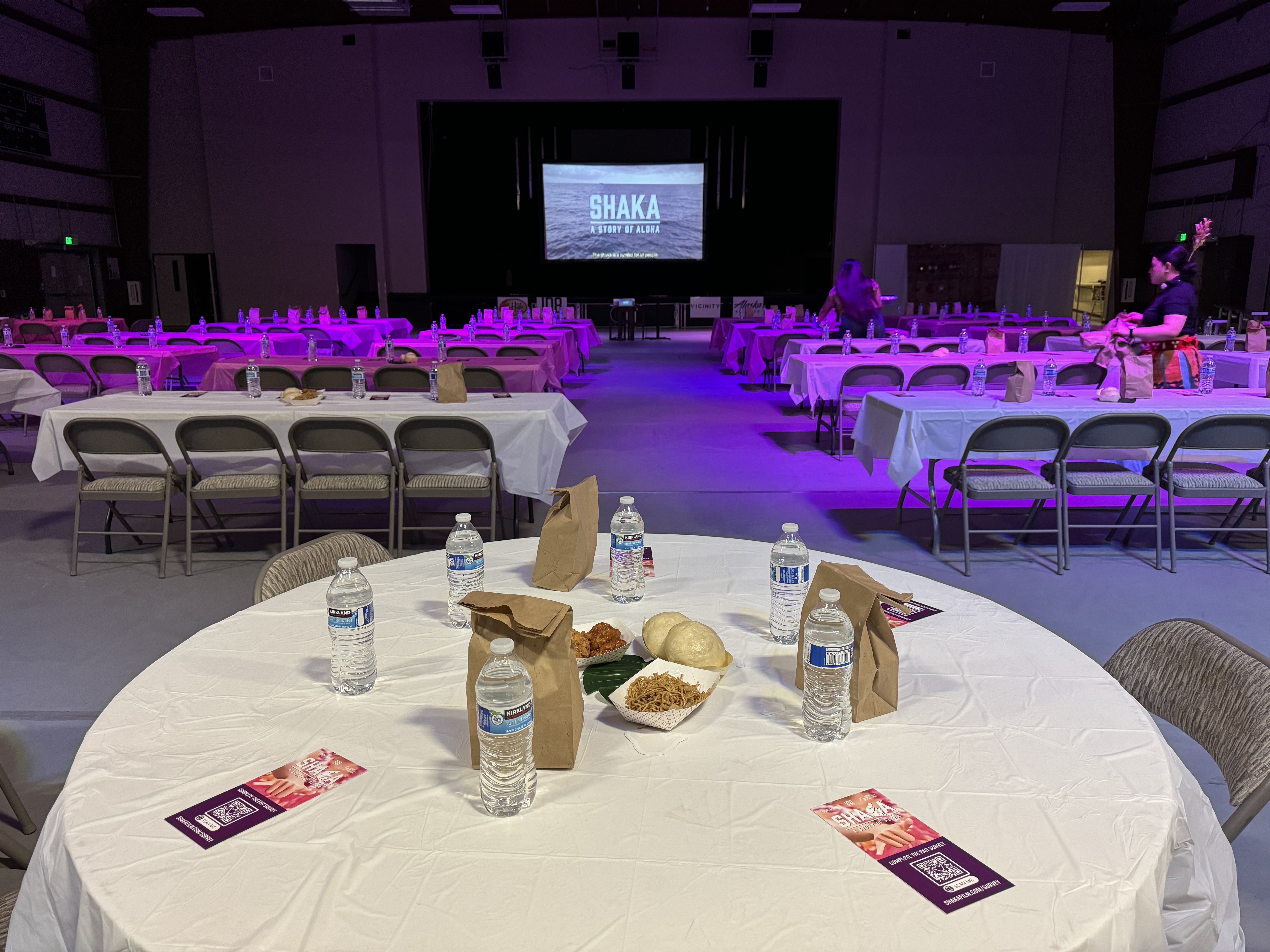
More than 250 people came together in the main hall of The Arctic Rec Center during Asian & Pacific American Heritage Month to see a special screening of a film from Hawaii. The first-of-its-kind gathering, hosted by the non-profit Pacific Communities of Alaska, featured dance performances, food, and an uplifting documentary about the familiar ‘shaka’ hand gesture and how it came to embody the spirit of Hawaii’s people and culture.
It was the first public showing of “Shaka: A Story of Aloha” since its world premiere two days earlier in Los Angeles.
“We knew we could learn from this chapter of Hawaii’s history, and find common threads among other Pacific Island communities and really all people,” said PCA Executive Director Tafilisaunoa Toleafoa.
The evening got off to a rousing start with dance performances by Ladies of the Pacific Dance Academy, Aualuma Group, and Hi’ilei Aloha Dance Company, showcasing styles like Samoan, Tahitian, Tongan, Tokelauan, and Hawaiian. The menu included Hawaii favorites spam musubi, manapua, and pork hash, provided by Hula Hands, Tatilani, Tracy Toefo’I, and Wingstop.
Finally, the documentary was introduced by its executive director Steve Sue, who has been working on the project for more than three years. “Shaka” untangles the many origin stories of the surfer “hang loose” sign while at the same time revealing broader messages of family, community, compassion, and resiliency—things that resonated with Toleafoa.
“The film showed that we can look beyond politics or faith or other differences and make a deliberate choice—to choose love,” she said.
The Asian American and Pacific Islander community—including Native Hawaiians—is the fastest growing community in the state of Alaska. There are more than 20,000 residents of AAPI ancestry—some multigenerational, many new immigrants—in the state, almost 70% of them in Anchorage.
The PCA, which emerged during the pandemic, is committed to helping all Pacific Islanders find services and support, from healthcare to scholarships to training. Toleafoa has grown the team to six full-time employees who work with partner organizations across the state. Her work earned her recognition as one of the 2024 “Top 40 Under 40” by the The Alaska Journal of Commerce, honoring her for excellence in professional and community service.
Toleafoa said the PCA has worked with Native Hawaiian businesses and groups in Anchorage, and has been stepping up its outreach to Native Hawaiians living in Alaska. She noted they are sometimes overlooked in AAPI programs.
“What we want to do at PCA is to provide space for Native Hawaiians to feel like they are part of AAPI work,” Toleafoa said. “Yes, they are part of the Pacific Islands, but they are similar to the indigenous Native Alaskans and Native Americans—the definition is important to me, to elevate them and their similar experiences.”
That conviction was only strengthened by the film.
“It was the right way to kick off AAPI Month in Alaska, to start with a story of the story of how we can love each other, but still appreciate the fact that we are different from each other,” Toleafoa said. “Our identities should not do anything to separate us, but they should be there to bring us together, to understand each other, try and learn from each other.”
The gala event was the brainchild of Justin Burgess, CEO and co-founder of IT services and consulting firm Vicinity, which serves clients in Alaska, Hawaii, and the Pacific Northwest.
“As soon as I learned about the ‘Shaka’ documentary, I knew I wanted to bring it to Anchorage,” he recalled. “Through our work in Hawaii and Alaska, we know that while the geographies and climates are very different, both have a great deal in common in the richness of cultures and deeply held values.”
A core part of the Vicinity mission, Burgess notes, is leveraging technology to connect and uplift indigenous and underserved communities, including rallying diverse partners and innovative funding models to provide accessible, sustainable services.
“Like the great work the PCA is doing, we’re also committed to connecting Pacific communities,” Burgess said. “Many here in Alaska are still connected to their island homes, and we want to support those powerful ties.”
Meanwhile, Alaska Airlines made it possible for filmmakers to attend the PCA event in person, flying them in from both Honolulu and Los Angeles. Burgess hosted them at his home.
“Our experience in Alaska was so full of warmth and joy and made clear that what we call the ‘aloha spirit’ is universal among our Pacific neighbors,” said Sue. “Despite a 40-degree difference in temperature, we are part of the same family.”
The PCA is preparing for some big events later this year. The second-annual Pacific Community of Alaska Health & Resource Fair is set for August 3. This free community event offers health screenings and other services, along with dozens of exhibitors and family activities.
PCA is also hosting a national conference in Anchorage this year, the Pacific Health Gathering, for the National Association of Pasifika Organizations. Taking place Sept. 29-Oct. 1, this event brings together community health workers, health care providers, researchers, public health officials, and other community stakeholders from across the country.
For more information on the “Shaka” documentary, visit SHAKAFILM.COM. For more information the non-profit Pacific Community of Alaska, visit PCALASKA.ORG. And for more information on Vicinity’s technology services, visit VICINITY.TEAM.
